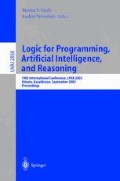Abstract.
This paper is about the question to what extent the addition of names (of points and sets) to the underlying language increases the expressive power of the modal logic of subset spaces. We ask, in particular, whether or not certain topological properties like separation or connectedness could become canonical then. Our answer is ‘yes’, if the system is enriched by two pairs of appropriate Gabbay-style rules.
Access this chapter
Tax calculation will be finalised at checkout
Purchases are for personal use only
Preview
Unable to display preview. Download preview PDF.
References
Blackburn, P.: Representation, Reasoning, and Relational Structures: a Hybrid Logic Manifesto. Logic Journal of the IGPL 8, 339–365 (2000)
Blackburn, P., de Rijke, M., Venema, Y.: Modal Logic. Cambridge Tracts in Theoretical Computer Science, vol. 53. Cambridge University Press, Cambridge (2001)
Bourbaki, N.: General Topology, Part 1. Hermann, Paris (1966)
Dabrowski, A., Moss, L.S., Parikh, R.: Topological Reasoning and The Logic of Knowledge. Annals of Pure and Applied Logic 78, 73–110 (1996)
Fagin, R., Halpern, J.Y., Moses, Y., Vardi, M.Y.: Reasoning about Knowledge. MIT Press, Cambridge (1995)
Georgatos, K.: Knowledge Theoretic Properties of Topological Spaces. In: Masuch, M., Polos, L. (eds.) Logic at Work 1992. LNCS, vol. 808, pp. 147–159. Springer, Heidelberg (1994)
Georgatos, K.: Knowledge on Treelike Spaces. Studia Logica 59, 271–301 (1997)
Heinemann, B.: Topological Modal Logics Satisfying Finite Chain Conditions. Notre Dame Journal of Formal Logic 39(3), 406–421 (1998)
Heinemann, B.: Axiomatizing modal theories of subset spaces (an example of the power of hybrid logic). In: HyLo@LICS, 4th Workshop on Hybrid Logic, Proceedings, Copenhagen, Denmark, July 2002, pp. 69–83 (2002)
Meyer, J.-J.C., van der Hoek, W.: Epistemic Logic for AI and Computer Science. Cambridge Tracts in Theoretical Computer Science, vol. 41. Cambridge University Press, Cambridge (1995)
Moss, L.S., Parikh, R.: Topological Reasoning and The Logic of Knowledge. In: Moses, Y. (ed.) Proceedings of the 4th Conference on Theoretical Aspects of Reasoning about Knowledge (TARK 1992), pp. 95–105. Morgan Kaufmann, San Francisco (1992)
Weiss, M.A., Parikh, R.: Completeness of Certain Bimodal Logics for Subset Spaces. Studia Logica 71, 1–30 (2002)
Author information
Authors and Affiliations
Editor information
Editors and Affiliations
Rights and permissions
Copyright information
© 2003 Springer-Verlag Berlin Heidelberg
About this paper
Cite this paper
Heinemann, B. (2003). Extended Canonicity of Certain Topological Properties of Set Spaces. In: Vardi, M.Y., Voronkov, A. (eds) Logic for Programming, Artificial Intelligence, and Reasoning. LPAR 2003. Lecture Notes in Computer Science(), vol 2850. Springer, Berlin, Heidelberg. https://doi.org/10.1007/978-3-540-39813-4_9
Download citation
DOI: https://doi.org/10.1007/978-3-540-39813-4_9
Publisher Name: Springer, Berlin, Heidelberg
Print ISBN: 978-3-540-20101-4
Online ISBN: 978-3-540-39813-4
eBook Packages: Springer Book Archive

